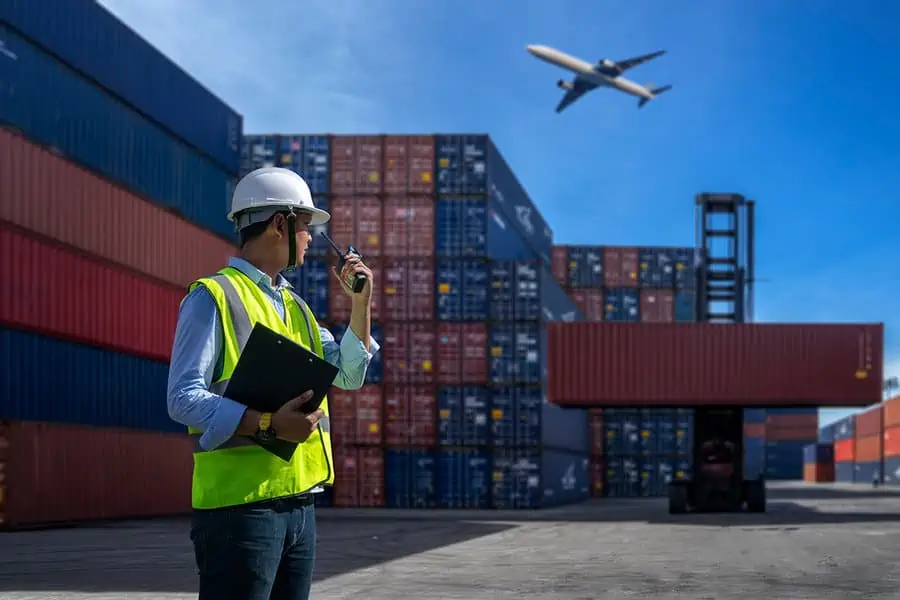Import-Export Careers – The Pros and Cons
January 31st, 2019
Business Careers

A career in the import-export industry can offer exciting and fulfilling opportunities. But it can also be very busy.
The industry deals with the exchange of goods and services between countries, importing and exporting items such as machines, technology and vehicles, mineral fuels like oil, and commodities like plastics. And if you work as an import-export agent, you have to manage shipments and logistics, comply with import-export regulations, provide customer service, and more.
To help you decide whether pursuing a career in the import-export industry is right for you, here are the pros and cons.
PROS
Working with global brands
You can work with companies from all around the world, including large multinationals that produce and sell branded goods (for example, apparel, footwear, furniture, cars, and tech gadgets). You’ll also be able to work with various truckers, airlines, steamship lines, and other vendors that have global brands.
You can travel a lot
The import-export industry is a global network that delivers products worldwide via sea or air freight. This gives you the opportunity to travel around the world on a regular basis, including to America, Europe, Australia and Asia. An import-export company might also have branches in other countries that you can visit as part of your job.
Very busy industry
In this industry, you’ll find international trade companies importing or exporting goods every day. You have people developing, delivering or receiving the products, tracking shipments, or dealing with regulations, problems, and customers. This means there’s always work that needs to be done, making it easy for you to enter the industry.
Plenty of jobs available
Apart from an import-export agent, there are other jobs available for those looking to work in the import-export industry. These include:
- Import-export analyst.
- Air or sea export agent.
- Import, export or logistics manager.
- Operations manager, supervisor or director.
- Production supervisor.
- Customs broker.
- International trade compliance manager.
Computer work
If you love working on the computer, then getting a job as an import-export agent is perfect for you. Here are some of the things you’ll need to do on the computer:
- Create rate quotes for customers, agents, and overseas offices.
- Create bookings and process documents for air and ocean import-export shipments.
- Monitor shipping status.
- Update customer profiles to keep them accurate and current.
- Invoice both customers and agents.
- Receive billings from vendors and agents.
- Use Microsoft Word, Excel, and Outlook.
Exports boost economic growth and efficiency
Exports provide two benefits for companies:
- They give domestic companies more experience in producing for foreign markets, which helps to create jobs, and over time they’ll gain a competitive advantage in global trade.
- They make companies more efficient, with research showing that exporters are more productive than companies that focus on domestic trade.
Imports offer lower prices and various goods and services
Imports provide two benefits for consumers:
- They allow foreign competition to reduce prices.
- They offer a wider variety of goods and services, including tropical and out-of-season fruits and vegetables.
Free trade agreements
Free trade agreements between countries allow them to increase international trade. For example, the North American Free Trade Agreement eliminates tariffs between the USA, Canada and Mexico, allowing the three countries to freely trade with each other.
CONS
Stress
The import-export industry is fast-paced and there’s a lot of work to get done. For example, an import-export agent has to do the following tasks:
- Coordinating the daily import and export of products, while ensuring they’ve been properly reviewed and documented.
- Tracking all shipments.
- Tracking and communicating delays, damages, and other problems, with the aim of resolving customer problems.
- Making sure that regulations, certificates, and documentation needs are met.
- Setting shipping schedules and communicating with customers, deliverers, and ports to verify loading, departure, and arrival times.
Dealing with many people
There are lots of people you have to deal with when working in the import-export industry. For example, you have to:
- Maintain daily contact with customers, agents, colleagues, deliverers, and ports.
- Maintain communication between overseas offices and agents.
- Work with various truckers, airlines, steamship lines, and other vendors.
- Work with large multinational companies and individual importers and exporters.
Trade restrictions
Trade restrictions such as tariffs, government subsidies to domestic industries, and anti-dumping legislation are implemented by some countries as protectionist measures, but they result in:
- Job reductions in domestic industries that can’t compete on a global scale.
- Job outsourcing, ie companies relocate call centres, technology offices, and manufacturing to countries with a lower cost of living.
- Countries with traditional economies losing their local farming base due to their prices being undercut.
Want to pursue a career in the import-export industry?
Like all careers, a job in the import-export industry has its cons, but the pros far outweigh them. Being a fast-paced industry, it can feel overwhelming at first, but with a bit of patience and practice, it can become an exhilarating and exciting industry to work in.
If you’re interested in working in this industry, check out our Import-Export course today.
Online, career focused education that suits your lifestyle.
See our coursesGladys Mae served as the General Manager and Head of Student Services at the International Career Institute (ICI) from 2010 to 2025. A graduate of the University of San Jose - Recoletos with a degree in Mass Communication (Broadcast Media), she brought exceptional communication and organisational strengths to the role. During her 15-year tenure at ICI, Gladys provided decisive leadership, ensured high-quality student support, and played a pivotal role in shaping a positive learning experience for thousands of students. Before joining ICI, Gladys built a diverse professional background through key positions in the banking and business process outsourcing sectors, giving her a strong foundation in customer service, operations management, and team leadership.





